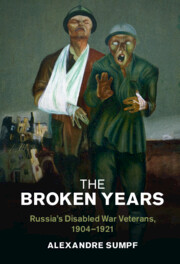Book contents
- The Broken Years
- Studies in the Social and Cultural History of Modern Warfare
- The Broken Years
- Copyright page
- Contents
- Figures
- Tables
- Acknowledgements
- Note on Usage
- Introduction
- 1 An Overwhelming Loss
- 2 The Right to Health
- 3 A Social Status Renegotiated by the War
- 4 Discriminatory Social Welfare
- 5 An Ephemeral Political Spring
- 6 The Devaluation of the War Experience
- Conclusion
- Bibliography
- Index
2 - The Right to Health
Published online by Cambridge University Press: 10 February 2022
- The Broken Years
- Studies in the Social and Cultural History of Modern Warfare
- The Broken Years
- Copyright page
- Contents
- Figures
- Tables
- Acknowledgements
- Note on Usage
- Introduction
- 1 An Overwhelming Loss
- 2 The Right to Health
- 3 A Social Status Renegotiated by the War
- 4 Discriminatory Social Welfare
- 5 An Ephemeral Political Spring
- 6 The Devaluation of the War Experience
- Conclusion
- Bibliography
- Index
Summary
The amputations and bodily harm inflicted on Russian society prompted a revolution on the medical and legal levels. An unprecedented right to both collective and individual health care arose out of a military necessity (of sending the greatest possible number of men back to battle) and international scientific competition. As a vast field of experimentation on the soldiers’ bodies and minds, the war led to the medicalisation not only of the army, but also of society. Medical specialisations appeared in Russia or were bolstered on the state level, and access to these cutting-edge therapies was rapidly made widely available. That made it possible to achieve decisive progress in treating veterans suffering from psychoneuroses: their institutionalisation, which became the norm, henceforth meant they would be cared for and not abandoned. The revolution in prosthetics likewise embodied efforts on the national level. The war prompted innovation and the organisation of nationwide production. It also made it imperative to guarantee that every amputee would receive an artificial limb. The prevalence of a utilitarian conception of the body and the quantification of its socio-economic contribution changed the perception of handicaps, which were now referred to in scientific rather than moral terms.
- Type
- Chapter
- Information
- The Broken YearsRussia's Disabled War Veterans, 1904–1921, pp. 55 - 103Publisher: Cambridge University PressPrint publication year: 2022

